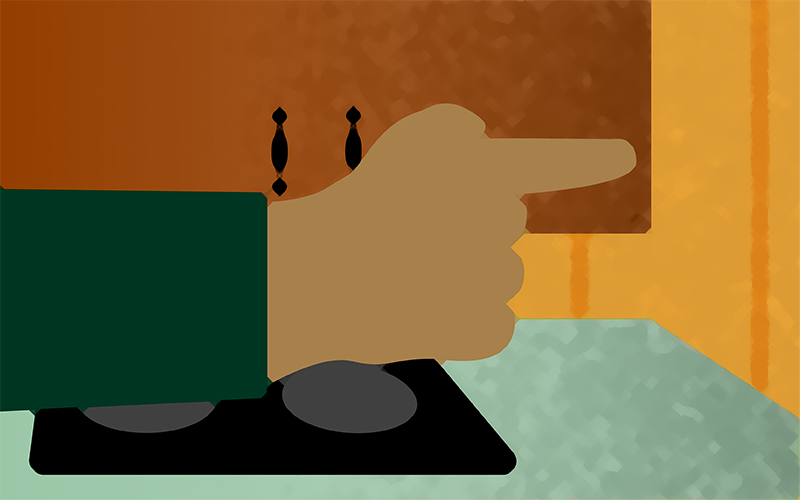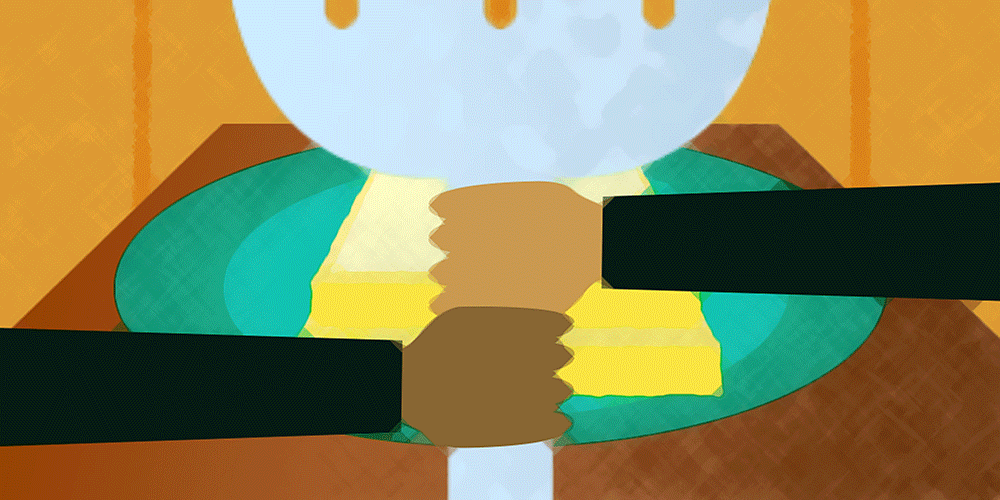Whatever I might say about my family, the food was always delicious. My father, Seymour Robbins, “Sim,” grew up in his parents’ Jewish deli in Stamford, Connecticut. They cooked all their own meats; corned beef, pastrami, and tongue, and all the side dishes; kugels, knishes, and salads. In the Army, during WWII, Sim was assigned to guard German prisoners of war who were being transported on a ship. Onboard the ship, my father became best buddies with the cook. He came home with some extra pounds and a few more cooking techniques.
In our household in Teaneck, NJ, my father did most of the day-to-day cooking, an unusual arrangement in the 1960s and 1970s. My mother’s mother, a formidable Russian-born woman whom we called Nana Vell, was an excellent cook. Nana coddled my mother, Rose, who was a poor eater as a child and consequently very thin. Nana worried that she would waste away. The first time my father came to dinner when my parents were courting, Nana placed a tiny chicken leg on his plate. She glared, then said in a warning tone, “Rose likes the white meat.” Rose, who was 19 when she married my father, was not at home in the kitchen. To tease my mother, my father would say he took over the cooking “in self-defense.” In fact, Rose had a few good dishes, mostly comfort food like chicken soup and compote. Like Nana, Sim was solicitous of my mother and showed his love by feeding her.
Nana was an excellent cook who served traditional Russian Jewish food prepared with a light and delicate touch. On Sundays, Nana commandeered our kitchen to make us a delicious supper of blintzes. Nana first mixed the batter in the blender, then cooked them one at a time in a small frying pan. She maneuvered the pan until the batter spread out to the edges, then she carefully tilted the pan to pour off any excess batter. A practiced flick of the wrist turned the crepe-like pancakes out thin but unbroken. She lined them up to cool on a dishtowel as they waited to be filled with a mixture of pot cheese, cream cheese, egg, sugar, and fresh blueberries. Pot cheese was a sort of dry cottage cheese with very small curds, mild and fresh, that is no longer available, similar to farmer cheese. Nana rolled the pancakes over the filling to make snug packets. She then fried them lightly so that the pancakes retained their fluffy texture and delicate taste. She served the blintzes with borscht, cold beet soup, garnished with a boiled egg, and turned deep pink with a dollop of sour cream. We oohed and aahed as the blintzes melted in our mouths until Nana said, “Is it good?” We laughed and she said, “You couldn’t die from it.” Then she pointed at a lone blintz left on the serving plate. “Findish it,” she commanded.
Stuffed as the blintzes themselves, we picked up our forks and ate some more. Dessert was rugelach, which Nana turned out by the thousands in her own small kitchen. Nana and Grandpa Vell lived a few blocks from us in a modest, spotless apartment. Nana rolled the rugelach out on her Formica dinette with military precision. Filled with raisins and apricot jam and dusted with cinnamon sugar, they were light but sturdy and not too sweet; so substantial and satisfying that if you had to live on them for a week, you would not suffer from malnutrition.
In the 1960s and 1970s, Sim began to experiment with gourmet food. This scene was repeated many times over. Nana marched into the kitchen, spine very straight, large bosom outthrust, a determined look on her face. My father followed, a twinkle in his eyes.
“A man in the kitchen,” Nana huffed, “who ever hoyd of it,” taking out the pot cheese.
“I have a new recipe for quiche,” my father said, “it’s French,” holding a pie plate.
“Geeshe, whoever heard of it,” Nana sneered, cracking eggs into the blender. “I’m cooking tonight, Mr. Rockefeller,” she said with an air of finality. Nana enjoyed teasing my father in this manner, and he took it good-humoredly. It was almost like she was flirting with him. I don’t know where the “Mr. Rockefeller” shtick got started. Though my father had a moderately successful career in advertising, he was no magnate; however, he was very handsome, with deep blue eyes that twinkled in a square face, rosy cheeks, and dramatic black hair.
“Yes, ma’am.” My father rolled his eyes as he backed out of the room on padded feet that were noiseless and soft, like his gentle hands. Sometimes my father did succeed in cooking dinner for Nana. When he presented her with an unfamiliar food like quiche, Nana glared at her plate and said, “What’s this supposed to be?” a phrase expressing skepticism as to whether the unfamiliar substance was really a food at all.
My father was an unaggressive person who deflected conflict with a chuckle and generally yielded to my mother’s every wish, but he fought doggedly for dominion over his kitchen. In taking on Nana, a formidable opponent, he was protecting the essence of his tender relationship with my mother. One day, my mother went to her bedroom with a sick headache and asked for French toast. Nana and my father went directly to the kitchen. Lying upstairs, my mother heard them arguing over who would have the privilege of making French toast.
“I know how my daughter likes it,” Nana announced.
My father countered with, “I know how my wife likes it.” As my mother clutched her head, they went back and forth until finally, my soft-spoken father had had enough. “Madam,” he said in a firm voice, “get out of my kitchen.”

When my mother’s parents left New Jersey to move to Florida, my father finally got control of his territory. My parents renovated and enlarged the kitchen. They moved the old appliances down to the basement to create a second, skeleton kitchen. Sim’s collection of Gourmet Magazines was his prized possession. In his free time, my father pored over each issue of Gourmet like it was the Bible, and began to test his abilities with some serious cooking. Thus began the era of the dinner party. On Saturday mornings, when my mother went to the beauty parlor, I would accompany my father to the grocery store, where I observed how carefully he chose produce. Sometimes he made me laugh by dancing in a silly way to the piped-in music. My father then spent the afternoon in the kitchen, turning out “exotic” gourmet dishes like moussaka and paella. I often hung around watching my father cook, basking in his warmth and serenity. His square hands with padded fingers seemed to caress the food. He padded around the kitchen softly, as if he was in meditation. He did not speak much, but from time to time, he acknowledged me with his twinkly eyes or an affectionate chuckle. His food was light and flavorful, never overly seasoned or oily. Once, in a restaurant, my mother ordered eggplant rollatini and commented on how much she loved it. My father went into the kitchen and chatted up the chef. When he came home, he recreated the dish perfectly, and it became a regular part of his repertoire. One night, as he slept, my mother heard him call out, “Bon appétit.”
Sometimes, as my father cooked, my mother followed him around the kitchen, cleaning so there would be no mess when he had finished. They joked that they were going to “hire out as a couple.” My parents gave superb dinner parties, usually for two or three couples at a time. My mother made excellent desserts for these parties, including my favorite, ladyfinger chocolate mousse cake. Sim was not big on the social part, which he privately mocked as “talk, talk, talk.” After dinner, as the guests praised his cooking, he sometimes dozed off in his chair, bored by the postprandial chitchat.
On Sundays in winter, when he could not play golf, my father cooked ahead for the week, storing dishes in the downstairs refrigerator of the auxiliary kitchen in the basement. As he puttered, the golf game in a warmer climate played on a small TV in the corner. On these afternoons, he had an aura of total peace and contentment. When the Cuisinart food processor was invented in 1973, it became my father’s prized possession.
At the end of her life, Nana lived with us. Though unsteady, she continued to vie with my father for control of the kitchen, until at last she lost her touch and put oregano-flavored breadcrumbs in the apple pie.
My father muttered, “This tastes like lasagna.”
My mother nudged him. “Just eat it.”
Nana turned her nose up at whatever my parents served her. Due to her difficulty chewing and swallowing, meals featured a constant refrain of, “Hard as a rock,” and, “Couldn’t chewed it.” Restaurant meals were her particular nemesis, and she soured many a meal, scoffing, “Could make it better at home.”
In 1982, my father died tragically of AIDS. After his death, we found out he had a secret life as a gay man, but that is another story. Nana died of old age a little more than six months later. I sometimes imagine that she was determined to keep up the battle with my father in the afterlife. My mother, who was supposedly so fragile, outlived them both for 37 years. When she married her second husband, she became an excellent cook. For the many years of her second widowhood, she survived very well on a diet that consisted primarily of yogurt, bananas, and coffee. •




